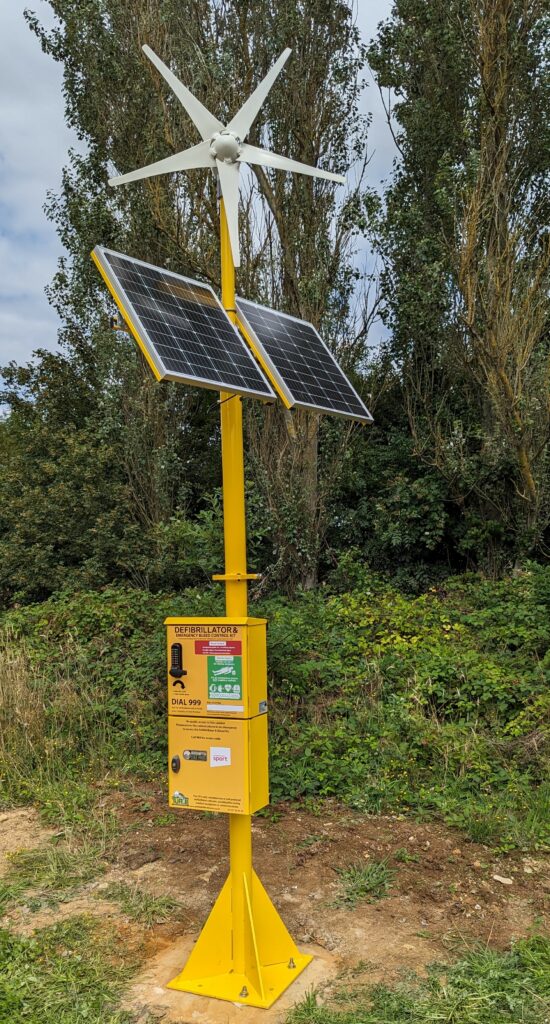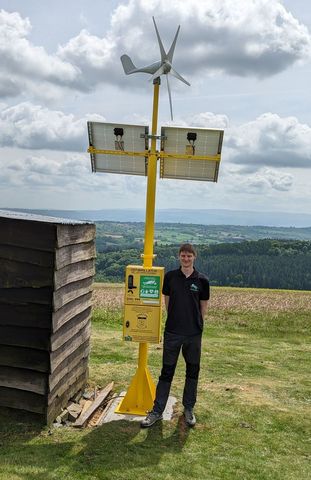
Turtle Defib Cabinets, which has a long partnership history with local authorities, emergency services and non-profits, has designed and engineered the UK’s first solar and wind powered defibrillator and bleed control cabinet. Northamptonshire Sport, one of 43 non-profit Active Partnerships focused on increasing physical activity levels, committed to setting a higher standard for saving lives when it installed a wind and solar powered defib cabinet in Northampton Bike Park in August 2023.
Defib cabinets must maintain a temperature above 0 degrees, although above 10 degrees is recommended; a solar and wind powered unit is therefore transformational for people in environments where an electricity supply may be restricted or cost-prohibitive to install – such as public and country parks and sports facilities.
As a pre-launch partner – along with Kington Golf Club, the highest 18-hole course in England – Northamptonshire Sport assisted with the final research stage, prior to the unit being available to purchase. Martin Barnwell, Strategic Director for Operations at Northamptonshire Sport, said: “It’s great to partner with Turtle on this project. The Bike Park has fast become a hub for cycling in Northamptonshire. Having the new defib and bleed kit on-site helps keep our visitors safer when they’re enjoying the trails and tracks.”
The Northamptonshire-based manufacturer, Turtle, undertook a two-year research and development period, which allowed them to engineer a product that successfully captures solar and wind power. Remote monitoring has also been developed to give cabinet custodians peace of mind day and night.

Defibrillator equipment is battery powered, but power is required to keep outdoor cabinets at the correct temperature, maintaining the life of the battery and efficacy of the equipment, including the defib pads. Cabinets are usually wired to an electrical source, but in remote areas or places where installation of an electric feed is cost prohibitive, solar powered cabinets have been used as an alternative. They are, however, fraught with issues, not least because of the UK’s limited winter sunlight and limitations of vertically placed panels.
Aided with funding from medical innovation support network Medilink UK, Mike Dowson, founder and Managing Director of Turtle and his team worked with The University of Warwick to conduct academic feasibility studies. He explains: “We not only identified that there was a gap in the market for a wind powered defib cabinet, but also that the solar products that were available are not designed in the most optimal way to harness solar energy. Our research and development over the last two years has ensured we could design, engineer and manufacture a failsafe defib and bleed control cabinet that will help to save lives in places where people were previously very vulnerable.”
Turtle’s innovative design negates the issues that current models present; the location and angle of the solar panel is optimal on Turtle’s cabinet, to help ensure a continuous supply of electricity. Nevertheless, research also discovered that in the UK winter, solar alone should not be relied upon to guarantee that defibrillator equipment would function correctly at all times. With wind power combined, the unit is not only failsafe, but it is also ideal for partly shaded locations and blustery environments.
Dowson continued: “Our design angles the solar panel in a way that maximises power from the sun’s rays, but also comprises a wind turbine to ensure the cabinet works when the UK weather is at its worst. The remote monitoring option provides a daily cabinet status, such as updates on environmental conditions, charge status, when the cabinet has been accessed or if there are any faults. If a wi-fi-enabled defibrillator model is selected, peace of mind can be gained without any manual cabinet checks.”
Bleed control kits do not need to be kept at a specific temperature. However, since Turtle engineered the first publicly accessible bleed control cabinet for The Daniel Baird Foundation bleed control kit, the company reports that the majority of its defib cabinet customers now select a combined unit. Local authorities – such as Mansfield Town Council, Tower Hamlets Council and Leicester City Council – are also placing bleed control kits inside legacy defib cabinets and Turtle provides an updated information sticker for the front of the cabinet is part of the service. The lifesaving packs were developed by West Midlands Ambulance Service and leading consultants from the Trauma Network and The Daniel Baird Foundation.
Dowson concluded: “The response from communities and users of Northampton Bike Park and members of Kington Golf Club has been fantastic and as you would expect, people have said they feel safer. When you know that every minute following a cardiac arrest decreases a person’s survival rate by 10 per cent – and you think about the ‘what if’ scenario – it’s hard to argue against the need for more public defib cabinets – wired or weather powered.”






Recent Comments